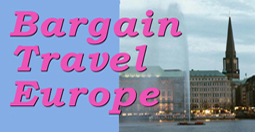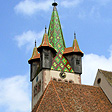PFAFFENHOFFEN
WWII Crossroads Town on the Moder
 Pfaffenhoffen
is not a particularly well known tourist town. A small village in
the Bas-Rhin region of Alsace, France and not to be confused
with towns of like name in Germany or Austria. Located 7 miles from
Hagenau, at ancient crossroads from Celtic times on the River Moder,
Pfaffenhoffen has a few claims to fame. It is the town name with the
most f’s in France, though exactly how many f's depends if you're
spelling in Franch or German. It was a home to Dr. Albert Schweitzer,
writer Jean-Paul Sartre and the
husband
of
Madame
Currie.
And for Americans
or World War II buffs, Pfaffenhoffen marked liberation of the Moder
River Valley and fighting in the Voges, the last stop of the 103rd
Infantry of Patton’s 3rd Army, before crossing the Rhine into
Germany in 1945.
Pfaffenhoffen
is not a particularly well known tourist town. A small village in
the Bas-Rhin region of Alsace, France and not to be confused
with towns of like name in Germany or Austria. Located 7 miles from
Hagenau, at ancient crossroads from Celtic times on the River Moder,
Pfaffenhoffen has a few claims to fame. It is the town name with the
most f’s in France, though exactly how many f's depends if you're
spelling in Franch or German. It was a home to Dr. Albert Schweitzer,
writer Jean-Paul Sartre and the
husband
of
Madame
Currie.
And for Americans
or World War II buffs, Pfaffenhoffen marked liberation of the Moder
River Valley and fighting in the Voges, the last stop of the 103rd
Infantry of Patton’s 3rd Army, before crossing the Rhine into
Germany in 1945.
 The
slightly odd name from old German essentially means “cleric’s
farm” as the land where the town lies belonged to the Benedictine
Abbey of Wissembourg, which owned large properties in Alsace, Lorraine
and the Rhine Palatinate in the middle ages. In the Renaissance times
at a crossing of two roads and river crossing, Pfaffenhoffen was a
prosperous market town and center of trade, especially the wool industry.
The town was the headquarters of the Shepards Brotherood, which monopolized
the wool trade in Lower Alsace. In more turbulent times, as a crossroads,
the town suffered in a number of wars, suffering devastation in the
Thrity Years War, the War of Spanish Succession (see Fortress Le Bitche),
the French Revolution and in WWII as one of the last towns liberated
in France by the 3rd Army after the Battle of the Bulge.
The
slightly odd name from old German essentially means “cleric’s
farm” as the land where the town lies belonged to the Benedictine
Abbey of Wissembourg, which owned large properties in Alsace, Lorraine
and the Rhine Palatinate in the middle ages. In the Renaissance times
at a crossing of two roads and river crossing, Pfaffenhoffen was a
prosperous market town and center of trade, especially the wool industry.
The town was the headquarters of the Shepards Brotherood, which monopolized
the wool trade in Lower Alsace. In more turbulent times, as a crossroads,
the town suffered in a number of wars, suffering devastation in the
Thrity Years War, the War of Spanish Succession (see Fortress Le Bitche),
the French Revolution and in WWII as one of the last towns liberated
in France by the 3rd Army after the Battle of the Bulge.
 Pfaffenhoffen
has a small old town featuring an ancient Jewish Syagogue and a small
Museum of the Popular Image, mostly featuring Alsatian
hand paintings on glass, and images and texts of local life. Many of
the town’s old wealth mansions are gone, but a few Renaissance
buildings can be found on the Rue de la Monnaie (Money
Street). On the road near the town hall can be found a marker erected
in 1991
marking
the
town’s part in the second world war with the inscription - "Dedicated
to the officers and men of the 103rd Infantry (Cactus) Division and
attached units of the United States Army and to loyal French soldiers
and citizens who assisted in the liberation of this portion of the
Moder River Valley during World War II". (Curiously, the 103rd
also got to Pfaffenhofen in Bavaria, Germany). Also on the main street,
check out the town’s
own heraldic symbol from its important past, the crossed keys of Peter
and Paul. © Bargain
Travel Europe
Pfaffenhoffen
has a small old town featuring an ancient Jewish Syagogue and a small
Museum of the Popular Image, mostly featuring Alsatian
hand paintings on glass, and images and texts of local life. Many of
the town’s old wealth mansions are gone, but a few Renaissance
buildings can be found on the Rue de la Monnaie (Money
Street). On the road near the town hall can be found a marker erected
in 1991
marking
the
town’s part in the second world war with the inscription - "Dedicated
to the officers and men of the 103rd Infantry (Cactus) Division and
attached units of the United States Army and to loyal French soldiers
and citizens who assisted in the liberation of this portion of the
Moder River Valley during World War II". (Curiously, the 103rd
also got to Pfaffenhofen in Bavaria, Germany). Also on the main street,
check out the town’s
own heraldic symbol from its important past, the crossed keys of Peter
and Paul. © Bargain
Travel Europe
Find
best travel and vacation deals in Bas Rhin Alsace on TripAdvisor
Web Info
Alsace
Tourism
These articles are copyrighted and the sole property of Bargain Travel Europe and WLPV, LLC. and may not be copied or reprinted without permission.
See Also:
KAISER WILHELM II FORT DE MUTZIG - ALSACE
MAGINOT LINE FORT SIMSERHOF – BITCHE

